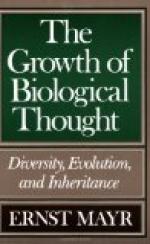6. But “the end of the commandment,” or the result of the process by which the soul is put into condition to contend successfully with the powers of evil, “is charity.” So religion preeminently rebinds men to the rule of not seeking their own advantage at the cost of others; because it implants a principle, which might dispense with the certainty of always calculating prudently in doing right. Charity seeketh not her own—not one’s own welfare calculated on the largest scale, exclusively, or at the cost of the greatest good of the whole. Thus it is essentially distinct from a prudence, however refined, and calculating its ends through eternity. It is called “the bond of perfectness,” or a most perfect bond; because, if men were all devoted thus disinterestedly, each to the good of the whole, society would be perfectly held together, without other bond. All forms of civil compact and voluntary association might be dispensed with. Even prudence might fail to calculate, how the present sacrifice to general good is to be compensated; and charity would rebind the man to love his neighbor as himself, and do as he would receive again.
It is further called “the perfect law of liberty;” as by a simple rule it perfectly secures to individuals those immunities, which constitutional provisions at best secure but imperfectly by complicated apparatus, and where philosophy halts at the perversities of human selfishness.
7. Faith alone is the sure foundation, whereto to add virtue [courage], and that for the further addition of knowledge. This courage is du Coeur—of the heart, and alone gives that simple love of truth, which, for its sake, dares equally to be new and singular, or to be vulgar and common-place. Without that foundation, assuming to be courageous enough to leave the beaten track, and reject received opinions, one does but attain to the bravery, which, in its efforts to dare danger or opposition, is sure to overact its part. Who holds an even balance in weighing evidence, equally guarded against rejecting the old, because it is old, or the new, because it is new? I know not, unless such as have apprehended the urwahr—the essential truth, which throws all temporal considerations into the shade.
There are two difficulties in the way of attempting changes in the existing state of things, with good prospect of improvement. The first arises from the force of habit, and a reluctance to try a new, it may be, hazardous course. The other form the little discrimination exercised, when men set about in earnest exchanging the old for the new—discrimination to avoid treating the old as necessarily antiquated, and the presumption of “laying again the foundation” of all things. And these difficulties will hardly be met successfully, except by men, in whom the fear of God has cast out other fear.




